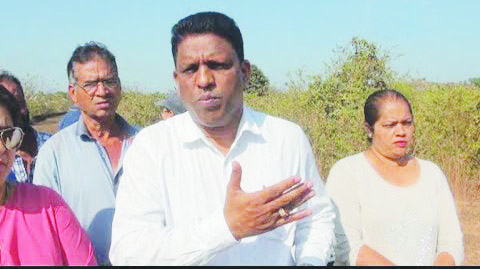ATTENTION: The Cuncolim MLA Clafasio Dias recovered completely and has been discharged though he was declared Covid-19 positive twice and was also comorbid. Part of the credit should go to his son who literally stood by his father for the 28 days that the MLA was in hospital.
Though Covid-19 is extremely infectious it is not a killer. In over 90% of the cases those who have been affected have recovered if they have received proper attention in time. It is the lack of awareness, particularly among the underprivileged that is leading to its continuous increase and growing mortality. Personal hygiene, public sanitization, is the key to avoiding and recovering from Covid-19…..
Since the initial outbreak, this coronavirus, known as SARS-CoV-2, has spread to most countries around the world. It has been responsible for millions of infections globally, causing hundreds of thousands of deaths. The United States is the most affected country.
As yet, there’s no vaccine against the novel coronavirus. Researchers are currently working on creating a vaccine specifically for this virus, as well as potential treatments for COVID-19.
HEALTHLINE’S CORONAVIRUS COVERAGE
Stay informed with our live updates about the current COVID-19 outbreak. Also, visit our coronavirus hub for more information on how to prepare, advice on prevention and treatment, and expert recommendations.
The disease is more likely to cause symptoms in older adults and those with underlying health conditions. Most people who develop symptoms of COVID-19 experience:
• Fever
• Cough
• Shortness of breath
• Fatigue
Less common symptoms include:
• Chills, with or without repeated shaking
• Headache
• Loss of taste or smell
• Sore throat
• Muscle aches and pains
Keep reading to learn more about the current treatment options for COVID-19, what types of treatments are being explored, and what to do if you develop symptoms.
What type of treatment is available for the novel coronavirus?
There currently isn’t a vaccine against developing COVID-19. Antibiotics are also ineffective because COVID-19 is a viral infection and not bacterial.
If your symptoms are more severe, supportive treatments may be given by your doctor or at a hospital. This type of treatment may involve:
• Fluids to reduce the risk of dehydration
• Medication to reduce a fever
• Supplemental oxygen in more severe cases
People who have a hard time breathing on their own due to COVID-19 may need a respirator.
What is being done to find an effective treatment?
The CDC recommends that all people wear cloth face masks in public places where it’s difficult to maintain a 6-foot distance from others. This will help slow the spread of the virus from people without symptoms or people who do not know they have contracted the virus. Cloth face masks should be worn while continuing to practice physical distancing. Instructions for making masks at home can be found hereTrusted Source.
Vaccines and treatment options for COVID-19 are currently being investigated around the world. There’s some evidence that certain medications may have the potential to be effective with regard to preventing illness or treating the symptoms of COVID-19.
However, researchers need to perform randomized controlled trials in humans before potential vaccines and other treatments become available. This may take several months or longer.
Here are some treatment options that are currently being investigated for protection against SARS-CoV-2 and treatment of COVID-19 symptoms.
What should you do if you think you have symptoms of COVID-19?
Not everyone with a SARS-CoV-2 infection will feel ill. Some people may even contract the virus and not develop symptoms. When there are symptoms, they’re usually mild and tend to come on slowly.
COVID-19 seems to cause more severe symptoms in older adults and people with underlying health conditions, such as chronic heart or lung conditions.
If you think you have symptoms of COVID-19, follow this protocol:
- Gauge how sick you are. Ask yourself how likely it is that you came into contact with the coronavirus. If you live in a region that has had an outbreak, or if you’ve recently traveled abroad, you may be at an increased risk of exposure.
- Call your doctor. If you have mild symptoms, call your doctor. To reduce transmission of the virus, many clinics are encouraging people to call or use live chat instead of coming into a clinic. Your doctor will evaluate your symptoms and work with local health authorities and the Centers for Disease Control and Prevention (CDC) to determine if you need to be tested.
- Stay home. If you have symptoms of COVID-19 or another type of viral infection, stay home and get plenty of rest. Be sure to stay away from other people and avoid sharing items like drinking glasses, utensils, keyboards, and phones.

When do you need medical care?
About 80 percentTrusted Source of people recover from COVID-19 without needing hospitalization or special treatment.
If you’re young and healthy with only mild symptoms, your doctor will likely advise you to isolate yourself at home and to limit contact with others in your household. You’ll likely be advised to rest, stay well hydrated, and to closely monitor your symptoms.
If you’re an older adult, have any underlying health conditions, or a compromised immune system, be sure to contact your doctor as soon as you notice any symptoms. Your doctor will advise you on the best course of action.
If your symptoms worsen with home care, it’s important to get prompt medical care. Call your local hospital, clinic, or urgent care to let them know you’ll be coming in, and wear a face mask once you leave your home. You can also call 911 for immediate medical attention.
How to avoid infection from the coronavirus?
The novel coronavirus is primarily transmitted from person to person. At this point, the best way to prevent getting infected is to avoid being around people who have been exposed to the virus.
Additionally, according to the CDC Trusted Source, you can take the following precautions to lower your risk of infection:
• Wash your hands thoroughly with soap and water for at least 20 seconds.
• Use hand sanitizer with at least 60 percent alcohol if soap isn’t available.
• Avoid touching your face unless you’ve recently washed your hands.
• Stay clear of people who are coughing and sneezing. The CDC recommends standing at least 6 feet away from anyone who appears to be sick.
• Avoid crowded areas as much as possible.
Older adults are at the highest risk of infection and may want to take extra precautions to avoid coming into contact with the virus.
The bottom line
At this point in time, there’s no vaccine to protect you from the novel coronavirus, also known as SARS-CoV-2. There also are no special medications approved to treat the symptoms of COVID-19.
However, researchers around the world are working hard to develop potential vaccines and treatments.
There’s emerging evidence that some medications may have the potential to treat the symptoms of COVID-19. More large-scale testing is needed to determine if these treatments are safe. Clinical trials for these drugs could take several months.

Excellent article. When one is struck with the covid we panic not knowing what to do. Point is how to get the above to the knowledge of the less privileged?
I know of a factory that tested its workers: one of the workers testing positive was asked to change his clothes and go home. He still stuck around not knowing what to do. The HR did not counsel him! What must he do at home? What next?
NOTE: Alcohol is highly volatile. WHO recommends sanitisers use either:
Isopropyl with 75% or ethanol with 80%. Manufacturers are allowed to produce with a tolerance of +/- 5%. 60 % can be 55%. when pouring on hand part is again evaporated. Follow WHO guidelines